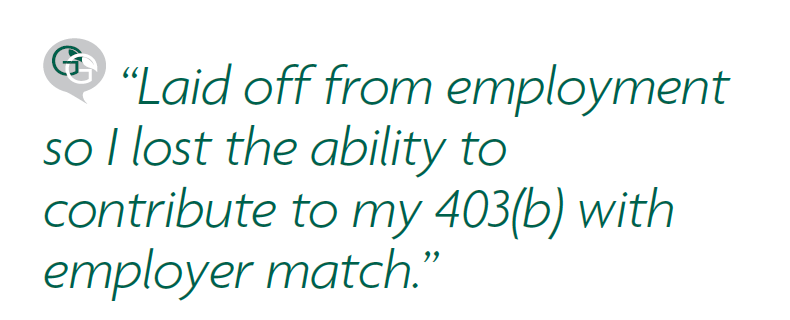
How the pandemic has affected financial planning
Sep 20, 2023, 7:52:04 PM | Reading Time: 6 minutes
Many of us are feeling the effects of the COVID-19 global pandemic, especially when it comes to managing our finances. We recently surveyed hundreds of consumers about how COVID-19 has impacted their money. Nearly half of the respondents agreed that the pandemic has influenced the way they handle their finances and how they save for the future.
Spending changes

For many people, household spending has been reduced dramatically during the pandemic. Survey respondents noted they are eating out at restaurants less, stocking up more on perishable items, and limiting or avoiding travel and vacations. While many have decreased unnecessary spending, it has caused some consumers to increase their spending in other areas of their life, like increased water and electricity bills.
What you can do
Revise your budget. Budgeting isn’t always fun to do, but it's vital to keep detailed tabs on your money, especially if your finances have been affected by the coronavirus. Consider cutting out some of the subscription services that you no longer use. Take stock of each subscription and membership and determine if it’s essential or not. If you can do without, get rid of it and put the extra money into a savings account or an emergency fund. You can also use that cash to pay off debt. Try a “snowball” strategy and pay off a card with the smallest balance to bolster your confidence and sense of accomplishment.
Income changes

Many household incomes have been greatly affected by the pandemic. In some cases, a person or multiple people in a household have seen changes due to job loss, furloughs, layoffs, significantly reduced hours, pay cuts, or demotions. This has led many people to reevaluate their biggest expenses and how to reduce them where possible.
What you can do
Find ways to cut back. If you have lost income due to the pandemic, look closely at some of your regular expenses for the opportunity to adjust costs. Dining out is an expense that can slowly take a toll on your budget, $20-$30 at a time. Make sure you watch how much you spend on ordering from restaurants. If you rent an apartment, try negotiating down the cost. Given the pandemic, your landlord may be more agreeable to rent breaks. If you own a house or condo, consider refinancing.
Investment alterations

The stock market has experienced volatility, causing some accounts to fluctuate. Many 401(k) accounts have taken a hit and some companies have stopped matching contributions. This uncertainty has caused many people to rethink how they invest their money. According to the survey, consumers who originally had a more aggressive investment mindset have adjusted their strategies due to COVID-19. Almost half (49%) said COVID has changed their investment mindset. As a result, people are changing where they are investing, altering their portfolios, redistributing funds into more conservative accounts, withdrawing their money completely, or pausing their contributions to their retirement account.
What you can do
Consider a fixed index annuity (FIA). At a time when consumers are looking for a way to reduce volatility in their finances and retirement planning, and insurance product like a fixed index annuity that offers downside protection and upside potential can be a good option. An FIA allows you to contribute a set periodic amount or lump sum, and then your premium can grow tax-deferred with an option to receive guaranteed payments throughout your retirement regardless of how the stock market does.
Increased and decreased savings

COVID-19 has caused many people to decrease how much they are saving and investing. Survey respondents said they feel like they have less available to set aside. Some say they have been forced to “dip into savings” to buy things they were not expecting. On the other hand, those who are less financially affected by the pandemic have decided to save more aggressively, stashing away money for emergencies or putting greater amounts of money in their savings accounts to plan for the unexpected.
What you can do (decreased savings)
If you have been hit hard by the pandemic, you could start by trimming nonessential expenses. The money saved on what you don’t need can be reallocated to your savings.
What you can do (increased savings)
If you are less financially impacted by the pandemic, your monthly expenses may have dropped because you haven’t been spending money on entertainment, travel, or activities for your kids. If that’s the case, it may be a good idea to add the surplus to your emergency savings. The rule of thumb is to save three to six months’ worth of expenses in an emergency fund. Given the uncertainty caused by the pandemic, you may consider trying to save a year’s worth of expenses.
Talk to a financial professional
Now more than ever, people are looking for clarity in their financial strategy and retirement plans. You don’t have to deal with the financial impacts alone. If you’re struggling with finances or simply need some advice to help secure your future, a financial professional can help you achieve your retirement goals. To find a financial professional near you, submit your information on our find an agent page.
To learn more about our findings on how COVID-19 has affected financial planning, download our white paper.
The term financial professional is not intended to imply engagement in an advisory business in which compensation is not related to sales. Financial professionals that are insurance licensed will be paid a commission on the sale of an insurance product.
Fixed index annuities are not a direct investment in the stock market. They are long term insurance products with guarantees backed by the issuing company. They provide the potential for interest to be credited based in part on the performance of specific indices, without the risk of loss of premium due to market downturns or fluctuation. Although fixed index annuities guarantee no loss of premium due to market downturns, deductions from the accumulation value for additional optional benefit riders or strategy fees associated with allocations to enhanced crediting methods could exceed interest credited to the accumulation value, which would result in loss of premium. They may not be appropriate for all clients. Interest credits to a fixed index annuity will not mirror the actual performance of the relevant index.
Neither North American, nor any financial professionals acting on its behalf, should be viewed as providing legal, tax or investment advice. Please rely on your own qualified tax professional.
Sammons FinancialSM is the marketing name for Sammons® Financial Group, Inc.’s member companies, including North American Company for Life and Health Insurance®. Annuities and life insurance are issued by, and product guarantees are solely the responsibility of, North American Company for Life and Health Insurance.
B14-NA-11-20
REV 11/2020
